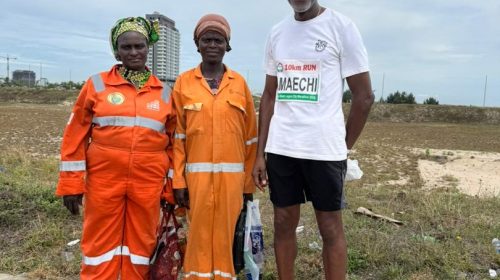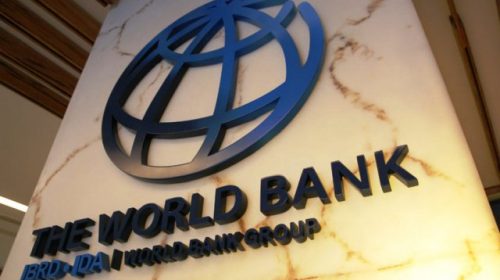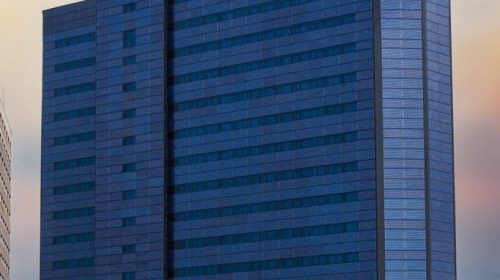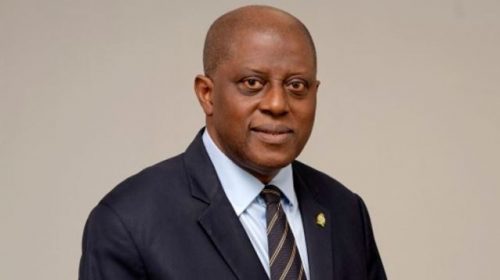Buhari proposes N8.6tr ‘Budget of Consolidation’

THE KEY PROJECTS
N10.00b for the Second Niger Bridge
About N300b for the construction and rehabilitation of strategic roads
President Muhammadu Buhari yesterday proposed a N8.612 trillion expenditure for next year.
The “Budget of Consolidation” is a nominal increase of 16 per cent above this year’s estimate.
The President told a joint sitting of the Senate and House of Representatives that the 2018 Budget will consolidate on the achievements of previous budgets and deliver on Nigeria’s Economic Recovery and Growth Plan (ERGP) 2018 – 2020.
The Federal Government presented a budget of N7.44 trillion for the outgoing year 2017.
The President noted that in keeping with the government’s policy, 30.8 per cent (or N2.652 trillion) of aggregate expenditure (inclusive of capital in Statutory Transfers) has been allocated to the capital budget.
The government, he said, expects fiscal operations to result in a deficit of N2.005 trillion or 1.77 percent of GDP.
The reduction in deficit is in line with the government’s plans under the ERGP to progressively reduce deficit and borrowings.
The deficit will be partly financed by new borrowings estimated at N1.699 trillion, 50 per cent of which will be sourced externally. The balance will be sourced domestically.
Buhari noted that the balance of the deficit of N306 billion was to be financed from proceeds of privatisation of some non-oil assets by the Bureau of Public Enterprises (BPE).
The proposed N8.612 trillion for 2018 aggregate expenditure comprises:
Recurrent Costs of N3.494 trillion; Debt Service of N2.014trillion; Statutory Transfers of about N456 billion; Sinking Fund of N220 billion (to retire maturing bond to Local Contractors); Capital Expenditure of N2.428 trillion (excluding the capital component of Statutory Transfers).
On Statutory Transfers, he said N 456.46 billion was provided in the 2018 Budget for Statutory Transfers.
The five per cent increase over last year’s provision, is mainly due to increases in transfer to Niger Delta Development Commission (NDDC) and the Universal Basic Education Commission (UBEC), which are related directly to the size of oil revenue.
On Debt Restructuring, the President said the debt service to revenue ratio was being closely monitored.
He added: “We shall address this ratio through our non-oil revenue-generation drive and restructuring of the existing debt portfolio. Presently, domestic debt accounts for about 79 per cent of the total debt. Our medium-term strategy is to reduce the proportion of our domestic debt to 60 per cent by the end of 2019 and increase external debt to 40 percent. It is noteworthy that rebalancing our debt portfolio will enhance private sector access to domestic credit. In addition, annual debt service costs will reduce as external debts are serviced at lower rates and repaid over a longer period than domestic debt.”
On Recurrent Expenditure, Buhari said a substantial part of the recurrent cost proposal for 2018 was for the payment of salaries and overheads in key ministries providing critical public services such as: N510.87 billion for Interior; N435.01 billion for Education; N422.43 billion for Defence and N269.34 billion for Health.
Buhari explained that the allocation to the ministries represent significant increases over votes in previous budgets.
Personnel cost is projected to rise by 12 per cent in 2018.
Buhari said although the government had made substantial savings by registering MDAs on the Integrated Personnel Payroll Information System (IPPIS) platform, the increase is mainly due to provision for staff promotion arrears, and recruitments by the military, police and para-military agencies.
He stressed that he had directed agencies not to recruit workers unless they obtained all the requisite approvals.
Any breach of the directive, the President warned, will be severely sanctioned.
Overhead Cost is projected to rise by N26 billion in 2018, a modest increase of about 12 per cent reflecting inflationary adjustments.
MDAs are required to adhere to government regulations regarding cost control.
On capital expenditure, Buhari said: ”To consolidate on the momentum of the 2017 Budget’s implementation, many ongoing capital projects have been provided for in the 2018 Budget.
“This is in line with our commitment to appropriately fund ongoing capital projects to completion. By allocating 30.8 per cent of the 2018 Budget to capital expenditure, the Federal Government is also demonstrating its strong commitment to investing in critical infrastructure capable of spurring growth and creating jobs in the Nigerian economy.”
He listed key capital spending allocations in the 2018 Budget to include: Power, Works and Housing: N555.88 billion; b. Transportation: N263.10 billion; c. Special Intervention Programmes: N150.00 billion; d. Defence: N145.00 billion; e. Agriculture and Rural Development N118.98 billion; f. Water Resources: N95.11 billion; g. Industry, Trade and Investment: N82.92 billion; h. Interior: N63.26 billion; i. Education N61.73 billion; j. Universal Basic Education Commission: N109.06 billion; k. Health: N71.11billion; l. Federal Capital Territory: N40.30 billion; m. Zonal Intervention Projects N100.00 billion; n. North East Intervention Fund N45.00 billion; o. Niger Delta Ministry: N53.89 billion; and p. Niger Delta Development Commission: N71.20 billion.
The President noted that as he previously indicated, “we aim to consolidate on our achievements in 2017”.
President Buhari specifically sought to bring the attention of National Assembly members to the following key projects and programmes that the government was determined to implement in 2018:
N9.8 billion for the Mambilla hydro power project, including N8.5 billion as counterpart funding;
N12 billion counterpart funding for earmarked transmission lines and substations;
N35.41 billion for the National Housing Programme;
N10.00 billion for the Second Niger Bridge; and
About N300 billion for the construction and rehabilitation of the strategic roads mentioned earlier.
The president said his ”administration remains committed to pursuing a gender-sensitive, pro-poor and inclusive growth”. We are keenly interested in catering for the most vulnerable. Accordingly, we have retained the N500 billion allocation to the Social Intervention Programme. Under the programme, N100 billion has been set aside for the Social Housing Programme.”
The government will also continue to implement the Conditional Cash Transfer (CCT) programme, as well as the National Home-Grown School Feeding programme in 2018.
On Regional Spending Priorities for Peace, Security and Development, Buhari noted that to maintain peace and security in the Niger Delta for economic and social activities to thrive, the provision of N65 billion for the Presidential Amnesty Programme has been retained in the 2018 Budget.
Besides, the capital provision for the Ministry of Niger Delta has been increased to N53.89 billion from the N34.20 billion provided in 2017.
This, he said, is to support the development in the region. We will complete all critical projects, including the East-West Road, which has a provision of about N 17.32 billion in 2018, Buhari said.
He said that across the nation, and particularly in the Northeast region, the government’s commitment to the security of life and property remains absolute.
“We will ensure that our gallant men and women in arms are properly equipped and well-motivated. The result of our efforts is evident in the gradual return to normalcy in the North East. It is in this spirit that I recently assented to the North-East Development Commission Bill that was passed by this Distinguished House. We expect that this development will consolidate on our ongoing efforts to combat insurgency, reintegrate Internally Displaced Persons and rebuild communities in the North East Region, which have been adversely affected by the insurgency.”
He noted that similar attention is being given to efforts to reduce violent crime across the country.
Cyber-crimes and the abuse of technology through hate speech and other divisive material that is being propagated on social media will get attention, according to the President, it was not immediately clear how the government will do this. There are rumours that some website, maybe blocked – a potentially controversial move.
He said that the Sovereign Wealth Fund, which was established in 2011 with US$1 billion, did not receive additional investment for four years when oil prices were as high as US$120 per barrel.
“However, despite record low oil prices, this Administration was able to invest an additional US$500 million into the Fund. This further demonstrates that in our struggle to have a stable and secure nation today, we have not, and will not, lose sight of the need to lay a solid foundation for the future prosperity of successive generations,” he said.
The Sovereign Wealth Fund to look inward and invest locally.
The President spoke of stability in the foreign exchange market due to the interventions by the Central Bank of Nigeria to improve access to liquidity, discourage currency speculation and increase net foreign exchange inflows.
He said, “As at the 30th of October, 2017, our external reserves had increased to US$34bn.”
On improved Tax Administration, the president said “Although the economy is diversified with non-oil Sector accounting for over 90 per cent of total Nominal GDP, the Government’s revenues are not as diversified yet. Our Tax-to-GDP ratio of about 6% is one of the lowest in the world. This situation is not consistent with our goal of having a diversified, sustainable and inclusive economy. Accordingly, we are stepping up efforts to ensure all taxable Nigerians comply with the legal requirement to declare income from all sources and remit taxes due to the appropriate authorities.
“Already, we have introduced the Voluntary Assets and Income Declaration Scheme (VAIDS) on the 1st of July, 2017. The Scheme provides non-compliant taxpayers with a nine-month window to regularise their tax status relating to historical periods. In return, overdue interest and penalties will be forgiven. In addition, no investigations or criminal charges will be brought against participating taxpayers. We expect that this Scheme will widen the tax net for both the Federal and State Governments. I am therefore, asking all Nigerians to seize this opportunity and do right thing. Let us not shy away from our duty to build a better Nigeria.”
“ Furthermore, we have also invested a lot of time and effort in identifying alternative means of funding new projects. For example, the recent 100 billion Naira Sukuk Financing will cater specifically for the development of 25 roads across the country. We also developed different structures that empower private investors to contribute to the development of roads of significant national importance. Already, we are seeing results. For example:
“The Bonny-Bodo Road is being jointly funded by the Federal Government and Nigeria LNG Limited. This project was conceived decades ago but it was abandoned. This Administration restarted the project and when completed, it will enable road transportation access for key communities in the Niger- Delta region.”
“The Apapa Wharf-Toll Gate Road in Lagos State is also being constructed by private sector investors in exchange for tax credits.”
President Buhari noted that Power Sector Reforms still remained a work in progress.
“The Federal Government’s estimated total revenue is 6.607 trillion Naira in 2018, which is about 30 percent more than the 2017 target. As we pursue our goal of revenue diversification, non-oil revenues will become a larger share of total revenues. In 2018, we project oil revenues of 2.442 trillion Naira, and non-oil as well as other revenues of 4.165trillion Naira.
“Non-oil and other revenue sources of 4.165 trillion Naira, include several items including: Share of Companies Income Tax (CIT) of 794.7 billion Naira, share of Value Added Tax (VAT) of 207.9 billion Naira, Customs & Excise Receipts of 324.9 billion Naira, FGN Independently Generated Revenues (IGR) of 847.9 billion Naira, FGN’s Share of Tax Amnesty Income of 87.8 billion Naira, and various recoveries of 512.4 billion Naira, 710 billion Naira as proceeds from the restructuring of government’s equity in Joint Ventures and other sundry incomes of 678.4 billion Naira.”
Proposed Expenditure for 2018
“A total expenditure of 8.612 trillion Naira is proposed for 2018. This is a nominal increase of 16 percent above the 2017 Budget estimate. In keeping with our policy, 30.8 percent (or 2.652 trillion Naira) of aggregate expenditure (inclusive of capital in Statutory Transfers) has been allocated to the capital budget.
“ We expect our fiscal operations to result in a deficit of 2.005 trillion Naira or 1.77 percent of GDP. This reduction is in line with our plans under the ERGP to progressively reduce deficit and borrowings.
“ We plan to finance the deficit partly by new borrowings estimated at 1.699 trillion Naira. Fifty percent of this borrowing will be sourced externally, whilst the balance will be sourced domestically. The balance of the deficit of 306 billion Naira is to be financed from proceeds of privatisation of some non-oil assets by the Bureau of Public Enterprises(BPE).
Nation







Leave a Reply